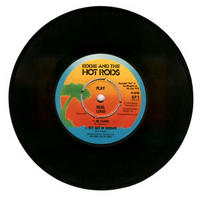 One of the more puzzling aspects of growing up during the oft-described 'golden age' of pop/rock - i.e. the 1960s and early 1970s (much of which still provides the basis of what we hear on the radio today) is that by the time I actually 'matured' into a teenager, very little of this music seemed relevant or particularly exciting.
One of the more puzzling aspects of growing up during the oft-described 'golden age' of pop/rock - i.e. the 1960s and early 1970s (much of which still provides the basis of what we hear on the radio today) is that by the time I actually 'matured' into a teenager, very little of this music seemed relevant or particularly exciting.At that time it was possible to relegate whole areas of rock music to yesterday's news in the space of a year or so - rock was still moving fast then. But by the mid 1970s, stagnation was evident all around. This was the time of the birth of arena rock. The first signs of the fossilization of hard rock were evident - evidenced clearly in the fate of the superbly soulful and inventive 1960s band Free as it mutated into Bad Company. Bad Company made more money and sold infinitely more records than Free ever did, but by their second album they had essentially run out of ideas. The 1970s saw a lot of this - artists recycling music that had seemed vital and growing in the 1960s into a stale copy. But many people loved this stuff, so there was plenty of incentive to keep it going.
In 1976, a review in New Musical Express of an EP by a London pub rock band called Eddie & The Hot Rods, that suggested that a whole new game was brewing. I bought this little gem - Live At The Marquee. This was the first record that revealed the true energy of the new movement that was going to become punk. Although I had already heard The New York Dolls and Iggy & The Stooges and knew that the style was out there, neither of those bands existed by 1976, and besides they seemed remote and out of reach to me. Not so with the Hot Rods - this was a local band. This record simply blistered - I imagined that if I had been there to witness the concert I would have been in a daze for a week afterwards.
The truly interesting thing about "Live At The Marquee" today is the solid line it joins between the 1960s garage band movement, rock and roll, the astonishingly vibrant singles put out in the pre-psychedelia 1960s and 1970s punk. Covers of "96 Tears", "Satisfaction", Bob Seger's 1970s rock 'n' roll obscurity "Get Out Of Denver" and the quintessential early punk-pop standard "Gloria" (which had also kicked off Patti Smith's "Horses") were rendered with the lo-fi speed and energy that would mutate with only marginal modification into the music of The Clash, The Buzzcocks and The Sex Pistols. Ironically, this embrace of 1960s music hurt The Hot Rods as the more militant bands that followed publically strove to distance themselves from this earlier music (while all the while drawing on the same musical roots). Within a year or so, The Rods were passe, despite two extremely strong LPs, and the band broke up not long afterwards.
Sad, but a story no different from many others. At least the music is available from Captain Oi! records in the UK
No comments:
Post a Comment